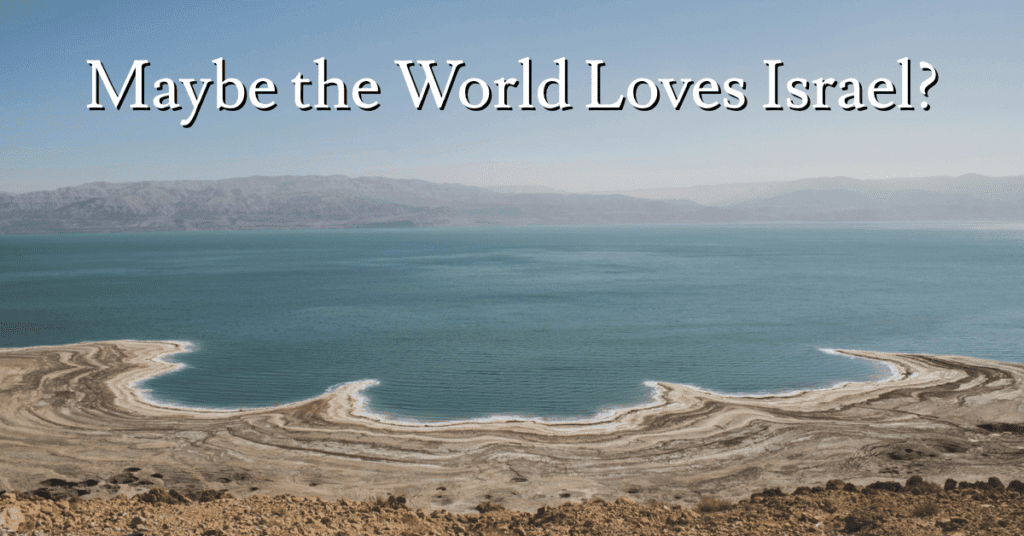Table of Contents
I’m confused by the world.
Who is on Israel’s side and who is against us?
On one hand, it’s very easy to believe Israel is loathed and there is no one out there who trusts us. This is the feeling I get when I look at the news. It’s what things seem like when I see statements from international bodies or world leaders. Or when I see protests in the streets of London or watch college kids aggressively disrupting student life.
And when I look at my social media, it seems like there are only two camps in the world: Us lowly confused Jews, who are bothered by everything we’ve witnessed in the past year, and the rest of the world, who sees only evil when they look at Israel and wonders with confusion how the universe has allowed it to exist this long.
Do they really hate us?

My question: Is this accurate? Is the dichotomy really this pronounced? If so, that is terrifying. But if it’s not the case, who wants us to think it is? What is the goal of making so many out there think those who stand adamantly against the State of Israel represent the vast majority of the world?
I honestly don’t know the answer to any of these questions.
But I’ll tell you this much: I’m confused by what I’m seeing.
One of my second homes is Quora, where I’ve been answering questions for years, but only recently spend the vast majority of that time educating anyone who’s listening about the history and current events of Israel. And the responses have been extremely interesting.
What’s in a name?

When someone responds to my answer, one of the first things I do is check the name of the responder. Why? Because I’m looking for potential bias.
If someone agrees with my response, but they have a name like Shimmy Weinberg, I’m grateful for their support, but understand I was likely just preaching to the choir. I’m not really interested in writing things for validation. I’m there to hopefully make a difference. To educate, when possible. And to create balance in a medium that seems filled with anti-Israel sentiment.
At the same time, my answers will often generate a lot of angry responses. I’ll get called names. I’ll be accused of lying. And people will spew facts that support a very anti-Israel view. These “facts” are often complex, ranging from the reasonable to the downright fictitious.
But like I do with the cheerleading squad, I check the names of the detractors as well. If they have a name like Omar Badawi, I am again outside my sphere of influence. As far as I’m concerned, there is a very large chance they’ve arrived to the discussion with a large bias, and no amount of persuasion or reason will help them listen to another perspective.
Whose Opinion Matters

No, my interest is far more piqued when they have a name like Thomas McMurphy or Xavier Menendez. Of course the possibility exists that these folk are Jewish or Muslim, or have family who are, or live immersed in one of the two communities, so their bias is super powerful. My observations here are far from scientific. But that doesn’t mean they are without merit.
So let’s assume that by observing names, I can predict with 85% accuracy who among the responders are neither Jewish nor Muslim, and are impartial observers of the conflict just trying to make sense of this world. What do those people think or believe?
That’s where things get interesting.
Of course there are other factors, and some are really hard to pin down. Who uses Quora? Are they concentrated in specific countries, and do those countries have views per capita different from other places? Do those who read my answers fit into a specific political mold? Are certain people more likely to get fired up and responsive than others?
These questions are impossible to answer. All I have is assumptions and observations. And even so, I think they are both interesting and informative.
Applauding Israel?

Let’s assume that Quora users represent a swath of the world’s population. They are from a wide variety of countries and cultures, and could thus be seen as a microcosm of the world at large. And let’s assume issues related to Israel on the global stage are ones that provoke thought and responses from diverse people across the political spectrum. Now let’s go back to my attempts to ignore the thoughts of those whose bias is or very well might be overtly biased, then I’m left with the following observations:
The world isn’t what the media or your social feed or world leaders or students on university campuses want you to think it is. The majority, perhaps even the vast majority, not only support Israel, but are extremely wary of Muslim extremism. They applaud Israel’s efforts to dismantle Hamas, seeing it as a mission that not only benefits the world, but one the other nations should be actively participating in as well.
A Glimmer of Hope

It’s impossible to know the truth.
But what I’m seeing gives me a glimmer of hope. Sure, there are people who respond to my answers blaming Israel for all that’s happening or comparing them to Nazis. But they’re the ones getting shouted down, not the other way around.
What if the world isn’t the way some people out there want us to see it?
What if Quora’s users represent a truer reality than the one others want represented?
I have certainly seen many times in my life where noise creates a false representation. There are communities in Israel where one particular demographic is a minority yet feels like the majority. Why? They’re the ones starting groups and programs. They’re the ones who are vocal when change is needed. They’re louder than others, and thus feel bigger.
Israel is loved?

To be sure, there are loads of people out there who hate Jews. And loads more who vehemently don’t support Israel.
I mean, even if it turned out that only 15% of the world hated Israel with a passion, that’s still over a billion people!
But what if the rest loved us? Or at least supported us or our right to exist?
But what if their support was quiet? It was in the shadows? Or it’s being actively downplayed by others?
The people of Israel know they’re in the right. Perhaps most others know it as well. Maybe it’s time for them to come out and tell the world.




and the big question remains, how to topple mainstream media so that the truth of our situation can be seen for what it is and the majority of people can be seen as the majority?